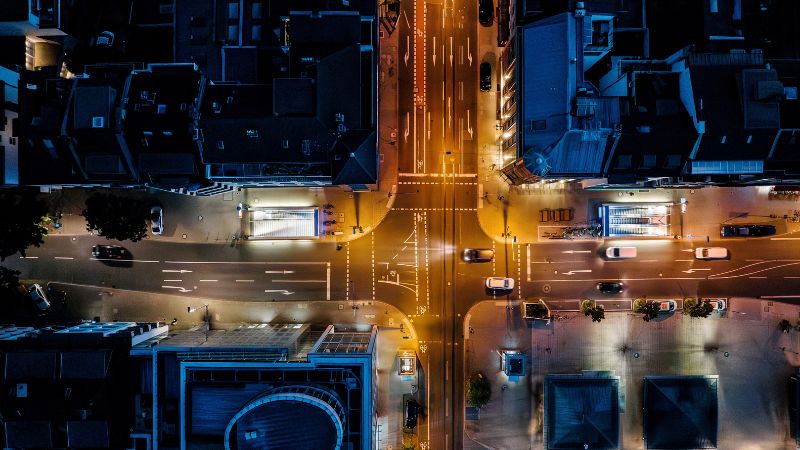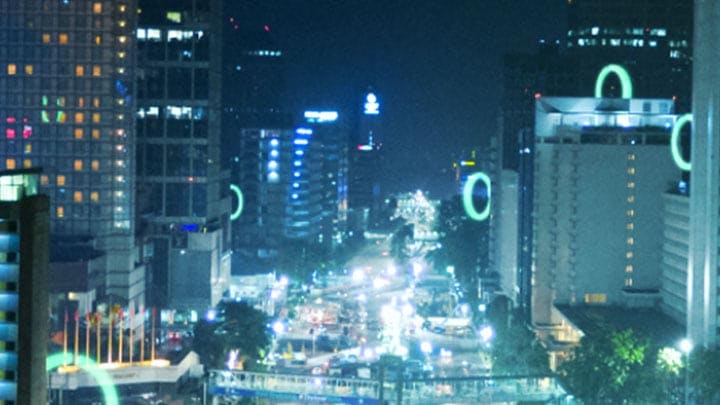February 16, 2024
February 16, 2024
The German city of Düsseldorf has set itself the target of becoming carbon-neutral by 2035. It sees the application of smart city technologies as key to achieving these targets and an intelligent public lighting system as the critical infrastructure for this transformation.
Düsseldorf decided to create a demand-based public lighting system that employs energy-efficient LEDs and offers luminaire-by-luminaire control to provide the best-quality lighting where it is needed and to reduce lighting where it is not.
Florian Fuchs
Smart city expert at Stadtwerke Düsseldorf
In 2022 Stadtwerke Düsseldorf began trialing Signify’s Interact connected lighting system as part of a pilot project in the city’s ”future district,” which Mr. Fuchs describes as “a laboratory for urban innovations.” It installed 42 networked Philips LumiStreet luminaires from Signify on a single street in the city’s busy and densely populated downtown area, all controlled by the Interact dashboard.
These luminaires produced a more direct, targeted, energy-saving light, concentrated on the street and sidewalk, ensuring public safety and security, while also reducing light pollution. The city installed sensors on some of the luminaires, which could monitor traffic levels and dim lighting as the number of cars on the road reduced.

Mike Oversberg
Planner at Netzgesellschaft Düsseldorf
Crucially, however, the system offers the flexibility to instantly increase lighting levels during an emergency, offering a critical advantage to emergency services.
Each luminaire can also send status reports back to the dashboard. The city can monitor energy use and energy savings at a granular level, while repairs and maintenance are easy to identify and manage and quick to fix. These smart but simple-to-implement innovations led to a 60% reduction in energy use.
The public lighting system is the city’s densest infrastructure network. Stadtwerke understood that the new lighting network was the perfect platform for other smart city applications, and so was keen to experiment and innovate.
A key priority was to use the system to manage traffic levels and flow, and create a new electric vehicle traffic charging infrastructure. Charging points were installed in public lights, while numerous sensors as well as a display mounted on a public light and a web application were used to alert drivers to available parking spots and charging points, reducing the number of cars endlessly trawling the dense inner-city streets looking for a free space.
The success of the pilot program has led Düsseldorf to extend the scope of its Interact smart lighting network. More than 3,000 LED street lights have already been integrated into the network, with 50,000 more to follow.

One key strength of the Interact system is that the entire city can be networked without replacing every street light, with non-Signify LED street lights integrated into the intelligent lighting infrastructure using the Outdoor Lighting Controller from Philips. The system is designed to easily integrate new smart city projects and technologies, ensuring that Düsseldorf has the platform it needs to meet energy savings and emissions targets and to improve the quality of life of its citizens.
Signify's Green Switch program has been designed to help cities with their sustainability and climate journeys, to invest in and install the most sophisticated public lighting, and to create a multi-tasking smart city platform.
Signify Global Media relations - Professional Lighting
Claire Phillips
Tel: +44 7956 489081
Email: claire.phillips@signify.com
Signify (Euronext: LIGHT) is the world leader in lighting for professionals, consumers and the Internet of Things. Our Philips products, Interact systems and data-enabled services, deliver business value and transform life in homes, buildings and public spaces. In 2023, we had sales of EUR 6.7 billion, approximately 32,000 employees and a presence in over 70 countries. We unlock the extraordinary potential of light for brighter lives and a better world. We have been in the Dow Jones Sustainability World Index since our IPO for seven consecutive years and have achieved the EcoVadis Platinum rating for four consecutive years, placing Signify in the top one percent of companies assessed. News from Signify can be found in the Newsroom, on X, LinkedIn and Instagram. Information for investors is located on the Investor Relations page.
